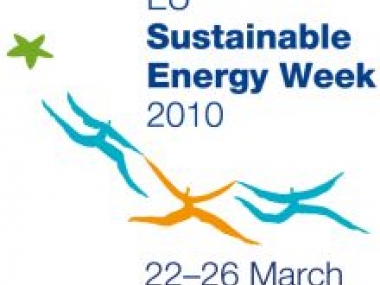EU Sustainable Energy Week: URBACT & Energy issues
Edited on
24 June 2019From Monday 22 to Friday 26 March 2010 the 4th edition of the EU Sustainable Energy Week (EUSEW 2010) will take place in Brussels and in other major cities across Europe. Sustainable Energy is more and more recognised as a priority challenge for urban areas. Several URBACT projects are directly or indirectly dealing with this energy issue.

Under the umbrella of the Sustainable Energy Europe Campaign, an initiative of the European Commission managed by the Executive Agency for Competitiveness & Innovation (EACI), the EU Sustainable Energy Week is Europe' s lead event on energy issues. This Campaign contributes to achieving the European Union's energy policy targets within the fields of renewable energy sources, energy efficiency, clean transport and alternative fuels. The EUSEW in 2009 combined 149 events in Brussels and outside with over 30,000 participants.
URBACT is actively involved in the field of sustainable energy. A new URBACT area of expertise ,which assemble URBACT projects that are working on similar or complementary topics, has just been created entitled 'Low Carbon Urban Environments'. Indeed, the response of cities to the climate question will be of prime importance in seeking to achieve sustainable and environmentally responsible urban futures. Five new URBACT projects have recently engaged to examine this area of concern attempting to extend our knowledge base, build strategies and concrete interventions as part of the drive towards the energy neutral city.
UrSEnE addresses the question of developing urban strategies for energy efficiency while targeting the elaboration of local energy action plans. URBENENERGY aims to develop integrated frameworks to improve energy efficiency and the use of renewable energy sources linked to the concept of energy conscious communities.
Two projects are also being developed with a focus on transport issues. Active Travel Network is tackling transport problems and mitigation of environmental impacts through the promotion of cycling and walking. EVUE takes on the relatively new but highly topical task of accommodating the use of electric vehicles in urban Europe (generating acceptance, assessing technological options and providing infrastructure) as a means of achieving clean air, clean car fleet targets. Last but not least, CASH investigates composite approaches to reduce energy consumption in the existing urban fabric (retrofitting etc.), but particularly focussing on improved efficiency to realise sustainable housing.
Read more:
- Low Carbon Urban Environments – URBACT website
- EU Sustainable Energy Week - website
Submitted by admin on
